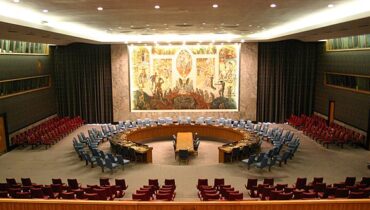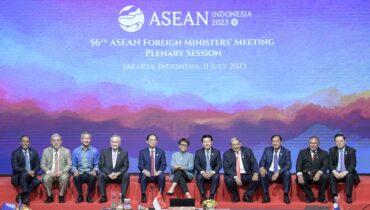Miriam Coronel Ferrer served as the Chief Negotiator of the Philippines Government in the Mindanao Peace Talks. Coronel Ferrer is also a professor of political science at the University of the Philippines. She received the Institute’s 2015 Hillary Rodham Clinton Award for Advancing Women in Peace and Security. Anna Applebaum, Hillary Rodham Clinton Research Fellow, sat down with her to discuss women’s political participation in peace negotiations.
Anna Applebaum: What are the greatest challenges and best opportunities for integrating more women into high level, track one peace negotiations?
Miriam Coronel Ferrer: Well, obviously there will have to be very conscious steps to fast-track the process. It cannot [be] simply something that you allow to evolve. It might take another hundred years, unless some very direct measures are undertaken, but opportunities are provided by the fact that some women have been there before. They have reached positions of power, which means that they can bring in more women.
“When the going is difficult and when there are so many other things that have to be settled, most of the time the gender issues are the ones that get sidelined.”
It’s also our responsibility to widen these pathways and enable more women to come in. Especially for those who have already reached the top of their careers through sheer hard work, and despite all of the discrimination that they had to encounter institutionally through their respective set-ups or the society as a whole. So definitely you still have these things – the biases, the prejudices, are very much part of society. Sexism is very much still out there, and it rears its ugly head every now and then. That means that there have been opportunities, there have been advances, but for a lot of ordinary women in the communities, the shackles are still there, and a lot more has to be done at all levels.
AA: I’m going to read a previous quote of yours. Speaking specifically about gender negotiations, you said, “From the beginning, we in the government were conscious that achieving parity of esteem or mutual respect and equal rights between the majority and minority populations of the country had to be accompanied by the goal of achieving parity of esteem between men and women, in terms of the process as well as the outcomes.” Can you speak more about how you work to create parity of esteem between men and women in processes as well as outcomes?
MCF: When you negotiate an agreement, there [are] a lot of compromises. So you can’t really have a perfect agreement, but you make an agreement more imperfect if you don’t have the women’s perspectives in that agreement, or if you don’t have their interests and welfare also at the back of your mind as you negotiate all the different components: the political, the social, the economic, and the cultural.
“You can’t really have a perfect agreement, but you make an agreement more imperfect if you don’t have the women’s perspectives.”
So it’s that kind of very basic starting point, which may not be very obvious to everyone, but which will have to be made obvious basically by the women themselves. Because you can count on some men to help you, but when the going is difficult and when there are so many other things that will have to be settled, most of the time the gender issues are the ones that get sidelined. It was very important to have more women inside the room, and also the other women outside. Because, you know, we were not exactly representing women’s organizations, they had a more comprehensive agenda, which they needed to project themselves and get as much as possible inside the negotiating table. Therefore, it had to be that kind of all-sided push coming from inside and outside the negotiating room to make sure that the agenda doesn’t get lost.
AA: Reflecting on your time as the first female chief negotiator to sign a final peace accord with a rebel group, what recommendations do you have for women who will be in similar situations, who will be chief negotiators in the future?
MCF: Let’s hope that there will not be too many hard conflicts to address in the future, but definitely negotiation and mitigation are part of everyday life, which means that the opportunities to play these roles at different levels—track one, track two, track three—are always there. A woman, in getting into this kind of situation, brings everything with her – her perspective, her social networks, which will naturally include other women as well. They will be your anchors when you do this work. It’s not easy; it’s very difficult, and you need that kind of moral support as well as a constituency behind you. It’s a lot of group effort. It requires a lot of consensus building, it requires a lot of engagement with different groups of people, and if you’re leading a team, teamwork is very important, as well.
AA: This is my last question, and it’s one that we ask all of our participants. What do peace and security mean to you?
MCF: It means everything. It’s about everyday life, but it’s also about how society is structured, how society is working to ensure that the basic necessities of life are provided for equitably. I think one scholar said that peace is like an umbrella, where all of these different advocacies come in. So it’s getting all of this together and framing it as peace and security, and seeing peace and security from a multidimensional perspective: the gender agenda, the environmental agenda, the social, economic, and, of course, the political as well. The question of weapons, militaries, etcetera have always been the basic starting points when you talk about peace and security. These are important, too, but they cannot be complete without all the other elements coming as well.
About the Author
Anna Applebaum is the 2015-2016 Hillary Rodham Clinton Research Fellow with the Institute. She previously worked at Vital Voices Global Partnership as a McLarty Global Fellow. Ms. Applebaum received her Master of Public Service from the Clinton School of Public Service. During her time at her alma mater, Washington University in St. Louis, she was awarded a George E. Mylonas Scholarship in Humanities and an internship at the White House. She graduated summa cum laude with a B.A. in the Interdisciplinary Project in the Humanities and French.


